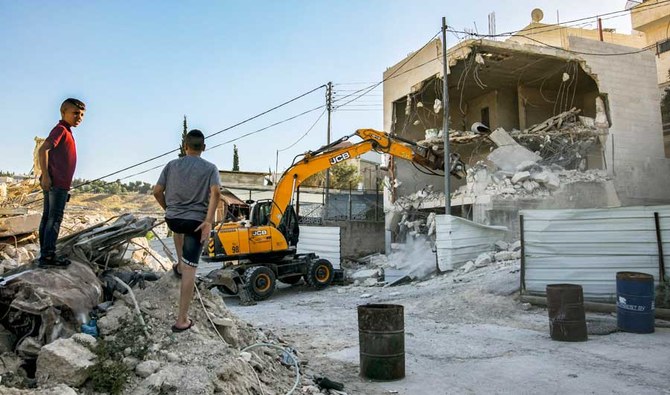JERUSALEM, WASHINGTON: Israel’s Supreme Court on Wednesday upheld the decision to destroy the family home of a detained Palestinian accused of a deadly shooting.
It rejected a petition by his estranged wife, who lives in the house with their children and says she knew nothing about the attack.
The case drew attention to Israel’s policy of demolishing the family homes of attackers after they have been killed or arrested.
Israeli officials say the demolitions deter future attacks, while rights groups view it as a form of collective punishment.
The US State Department has urged a halt to punitive home demolitions.
An internal review by the Israeli military in 2004 reportedly questioned its effectiveness as a deterrent, leading the military to largely halt such demolitions for nearly a decade.
It resumed the practice in 2014 after three Israeli teenagers were kidnapped and killed in the West Bank.
Israel says Muntasser Shalaby carried out a May 2 drive-by shooting in the occupied West Bank that killed an Israeli and wounded two others. He was arrested days after the attack.
His wife, Sanaa Shalaby, said they were estranged for several years and that he spent most of his time in Santa Fe, New Mexico, where he had married three other women in unofficial Islamic ceremonies. The entire family has US citizenship.
Sanaa said he would return to the West Bank for a month or two every year to visit their three children, aged 17, 12 and 9, who live with her in the home in the village of Turmus Ayya.
HaMoked, an Israeli rights group representing her, said he had a history of mental illness.
In upholding the demolition order, the Supreme Court noted that Muntasser had lived in the home continuously from 2006-2012, before their estrangement, and had resided there for weeks before the attack. It said the petitioners did not present sufficient evidence to show he had suffered from mental illness.
FASTFACT
The ‘disappointing’ judgment would allow the military to expand the use of punitive home demolitions.
Jessica Montell, the executive director of HaMoked, said the “disappointing” judgment would allow the military to expand the use of punitive home demolitions.
Her group is weighing whether to request another hearing and says the court is unlikely to grant one. She said the house could be demolished anytime after an interim injunction expires on June 30.
“If Mrs. Shalaby’s legal recourse has been exhausted, the diplomatic recourse is crucial: Is the US government going to allow this blatant collective punishment against a US citizen mother and three children?”
The State Department did not immediately respond to a request for comment on the ruling. Earlier this month, it called on Israel and the Palestinians to refrain from any actions that undermine efforts to revive the peace process, including punitive home demolitions.
“The home of an entire family should not be demolished for the actions of one individual,” it said.
Democrats’ stance
A new poll on American attitudes toward a core conflict in the Middle East finds about half of Democrats want the US to do more to support the Palestinians, showing that a growing rift among Democratic lawmakers is also reflected in the party’s base.
The poll from The Associated Press-NORC Center for Public Affairs Research finds differences within both the Democratic and the Republican parties on the US approach toward Israel and the Palestinians, with liberal Democrats wanting more support for the Palestinians and conservative Republicans seeking even greater support for the Israelis.
The survey also examined Americans’ opinions on the Biden administration’s handling of the Israel-Palestinian conflict.
The survey was conducted about three weeks into a ceasefire following a devastating 11-day war last month between Israel and the Gaza Strip’s Hamas militant rulers. The fighting killed at least 254 Palestinians and 13 people in Israel.
The poll shows Americans overall are divided over US policy toward Israel and the Palestinians. It also shows more Americans disapprove of President Joe Biden’s approach to the conflict than approve of it.
Among Democrats, 51 percent say the US is not supportive enough of the Palestinians. The sentiment jumps to 62 percent among Democrats who describe themselves as liberal.
On the other hand, 49 percent of Republicans say the US is not supportive enough of the Israelis, a number that rises to 61 percent among those who say they’re conservative.
Paul Spelce, a 26-year-old Democratic-leaning independent voter and supporter of Palestinian statehood, is a member of a heavily religious Texas Republican family whose support for Israel is ingrained with their Christian faith.
Spelce, of Austin, says he followed news of last month’s Gaza war and the US response closely on the radio as he helped deliver mail.
“I started paying a lot more attention,” said Spelce, who said he disapproved of Biden’s handling of the conflict and thinks the US is too supportive of Israelis and not supportive enough of the Palestinians.
“I don’t think Biden’s word was that strong,” Spelce said. “And I don’t think, you know, this administration ... can actually do anything” regarding the conflict.
Overall, the poll shows that 29 percent of Americans say the US is too supportive of the Israelis, 30 percent say it’s not supportive enough and 36 percent say it’s about right.




























